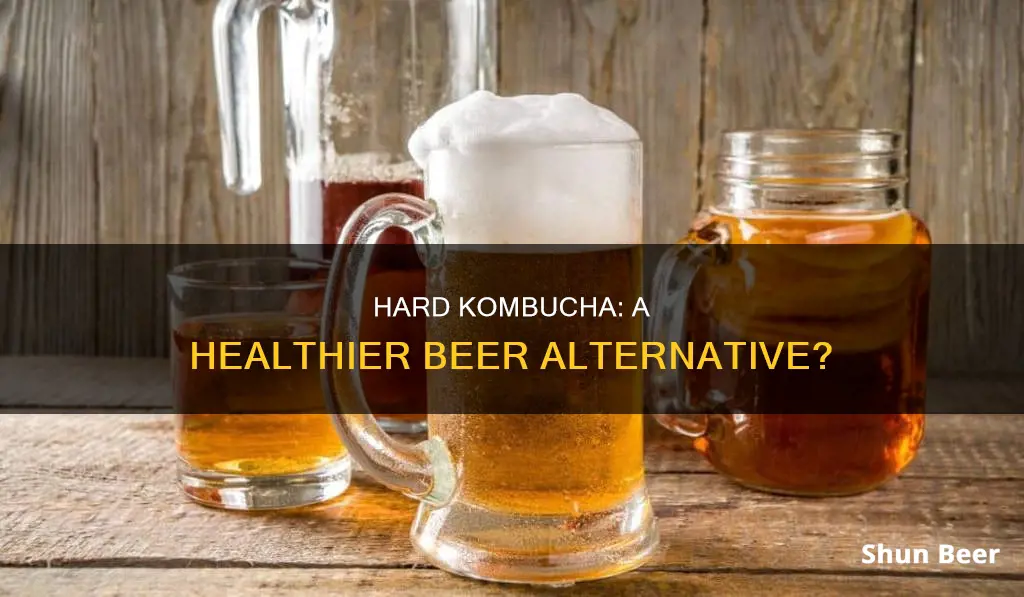
Hard kombucha is a fermented drink made from tea, sugar, and yeast. It has gained popularity as a healthier alternative to alcoholic drinks like beer and wine. While it offers some nutritional benefits, such as vitamins, minerals, and antioxidants, the higher alcohol content in hard kombucha may reduce the number of beneficial probiotics typically found in regular kombucha. So, when comparing hard kombucha with beer, it is essential to consider both the potential health benefits and drawbacks of each beverage to determine which is the healthier option.
What You'll Learn

Hard kombucha has fewer calories, sugars and carbs than beer
Hard kombucha is a fermented drink prepared from tea (green, black, or white), sugar, and yeast. It differs from non-alcoholic kombucha in terms of the amount of tea, sugar, and starter culture or yeast used, as well as the length of the fermentation period. The longer fermentation time results in a higher alcohol content, which distinguishes hard kombucha as an alcoholic beverage.
When compared to beer, hard kombucha generally contains fewer calories, sugars, and carbohydrates. A 12-ounce beer typically contains about 150 calories, while some craft beers can have up to 350 calories. On the other hand, hard kombucha usually has 85 to 170 calories per can, depending on the brand. This lower calorie content makes it a preferred choice for health-conscious individuals.
In addition to having fewer calories, hard kombucha also contains less sugar than beer. Hard kombucha typically has between two and four grams of sugar, and some brands even offer virtually sugar-free options. This is in contrast to beer, which often contains more sugar.
Hard kombucha also tends to have fewer carbohydrates than beer. This makes it an attractive option for those following a low-carb diet or looking to reduce their carbohydrate intake. The gluten-free nature of hard kombucha also makes it a good choice for those with gluten intolerance or celiac disease.
While hard kombucha may have fewer calories, sugars, and carbs than beer, it is important to remember that it is still an alcoholic beverage. As such, it should be consumed in moderation and is not a substitute for a healthy diet and lifestyle. Excessive consumption of hard kombucha can lead to the same negative health effects as other alcoholic drinks, including liver damage.
Stout Beer: Healthy Choice or Unhealthy Indulgence?
You may want to see also

Hard kombucha is gluten-free, unlike beer
Gluten is a family of proteins found in grains such as barley and wheat. Celiac disease is an autoimmune disorder triggered by gluten, affecting around 1% of people worldwide. For those with celiac disease, gluten triggers an immune response that damages the lining of the small intestine, interfering with nutrient absorption. Symptoms can include abdominal pain, bloating, and diarrhoea. A strict gluten-free diet is the only treatment for celiac disease, so gluten-free alcoholic drinks like hard kombucha are a valuable option.
Even for those without celiac disease, gluten-free drinks like hard kombucha may be a healthier choice. Some people experience non-celiac gluten sensitivity, with symptoms such as abdominal pain, headaches, and fatigue. While less severe than celiac disease, gluten sensitivity can still cause discomfort. Choosing gluten-free drinks like hard kombucha may help alleviate these symptoms.
In addition to being gluten-free, hard kombucha has other potential health benefits. It is often seen as a gut-friendly alternative to standard alcoholic drinks due to its natural ingredients and probiotics. Hard kombucha is typically made from black or green tea, which provides polyphenols and antioxidants. However, the higher alcohol content in hard kombucha compared to regular kombucha may reduce the number of beneficial probiotics.
While hard kombucha may be a healthier alternative to beer for those seeking gluten-free options, it is important to remember that it is still an alcoholic drink. Alcohol can negatively affect gut health, and excessive consumption can lead to adverse health effects such as liver damage. Therefore, hard kombucha, like any alcoholic beverage, should be consumed in moderation.
The Pros and Cons of IPA Beer Consumption
You may want to see also

Hard kombucha has a higher alcohol content than beer
Hard kombucha is a fermented drink prepared from tea (green or black), sugar, and yeast. The fermentation process that produces ordinary kombucha generates a trace amount of alcohol, but not enough to cause intoxication.
Hard kombucha differs from regular kombucha in terms of the amount of tea, sugar, and starter culture or yeast used, as well as the duration of fermentation. The longer fermentation period in hard kombucha results in a higher alcohol content.
The alcohol content in hard kombucha typically ranges from 4.5% to 7% ABV, which is higher than the average alcohol content in beer, which is around 5% ABV. This means that hard kombucha has a more pronounced effect on the drinker compared to beer.
The higher alcohol concentration in hard kombucha may also influence the viability of probiotics, which are one of the main health benefits associated with regular kombucha. Some companies have found that the probiotics cannot withstand high ABV levels, resulting in reduced probiotic content in hard kombucha compared to its non-alcoholic counterpart.
While hard kombucha may have a higher alcohol content than beer, it is important to note that the overall health impact of a beverage depends on various factors, including calorie content, sugar levels, and the presence of beneficial compounds such as vitamins, minerals, and antioxidants. Therefore, when comparing the health benefits of hard kombucha and beer, it is essential to consider all these factors in addition to the alcohol content.
Angry Orchard vs Beer: Which is the Healthier Choice?
You may want to see also

Hard kombucha has more sugar than other alcoholic drinks
Hard kombucha is a popular alcoholic beverage among health-conscious drinkers. It is made from tea (green or black), sugar, and yeast. The drink is fermented for a long time, which results in a higher alcohol content than regular kombucha. This also means that hard kombucha has more sugar than other alcoholic drinks.
Hard kombucha creates alcohol by using sugar. The longer fermentation process means that more sugar is converted to alcohol. Therefore, it makes sense that hard kombucha has more sugar than some other alcoholic drinks.
Hard kombucha has between two and four grams of sugar or more, depending on the brand. Some hard kombuchas are virtually sugar-free, but this is not always the case. Most varieties are not free from sweeteners.
When compared to other alcoholic drinks, hard kombucha has less sugar than cranberry juice and other mixers. For example, a mojito contains 25 grams of sugar.
Hard kombucha is a healthier alternative to other alcoholic drinks because it has fewer calories and less sugar. It is also gluten-free, which is not the case with beer.
While hard kombucha has more sugar than other alcoholic drinks, it is important to note that it still has fewer calories overall. This makes it a better option for people who are watching their weight or trying to be conscious of their calorie intake.
Beer's Gut Benefits: Friend or Foe?
You may want to see also

Hard kombucha may have fewer probiotics than regular kombucha
Hard kombucha is a fermented drink made from tea (green, black, or white), sugar, and yeast. The drink is prepared by allowing the ingredients to ferment for a longer period, resulting in a higher alcohol content compared to regular kombucha. This longer fermentation process, however, may have an impact on the number of probiotics present in the final product.
Probiotics are one of the primary health benefits of regular kombucha. The drink contains strains of beneficial bacteria that promote gut health and support healthy digestion. These bacteria, often referred to as "good" or "helpful" bacteria, can improve digestion, enhance immune function, and even positively influence mental health.
The higher alcohol concentration in hard kombucha, however, may affect the viability of these probiotics. Some health nutritionists and experts suggest that hard kombucha does not contain a significant amount of beneficial probiotics. The alcohol by volume content (ABV) plays a crucial role in the survival of these microorganisms.
Several companies have tested their hard kombucha products and found that the probiotics cannot withstand high ABV levels. The specific alcohol tolerance of probiotics in hard kombucha will vary depending on the brand and its ABV. As a result, hard kombucha may have fewer probiotics compared to regular kombucha.
While hard kombucha may offer some health benefits due to its natural ingredients, such as black or green tea, the higher alcohol content may reduce the number of beneficial probiotics typically associated with regular kombucha. Therefore, while hard kombucha can be a healthier alternative to other alcoholic drinks, it may not provide the same probiotic benefits as its non-alcoholic counterpart.
Clarified Beer: Healthier Option or Just a Fad?
You may want to see also
Frequently asked questions
Hard kombucha is generally considered to be a healthier alternative to beer. It has fewer calories, sugars, and carbohydrates. However, it should not be considered a health drink as it still contains alcohol and discretionary calories.
Hard kombucha is made through a similar fermentation process to regular kombucha, which involves bacteria, yeast, and sugar reacting with black or green tea. This process is believed to create probiotics, which are beneficial bacteria that can improve gut health and digestion. However, the higher alcohol content in hard kombucha may kill some of the bacteria, reducing its probiotic benefits.
Hard kombucha is made with natural ingredients like black or green tea, which provide vitamins, minerals, antioxidants, and polyphenols. It is also gluten-free and has fewer calories, sugars, and carbohydrates than beer and some cocktails. However, it is still an alcoholic drink, and excessive consumption can lead to adverse health effects such as liver damage.
While hard kombucha may offer some health benefits, it is still an alcoholic beverage. Drinking too much in one sitting can lead to a hangover, and excessive consumption over time can cause liver damage, weakened immune function, and other negative health effects. It should be avoided by individuals who are pregnant, breastfeeding, or have liver or kidney conditions, as well as those who are immunocompromised or elderly.







